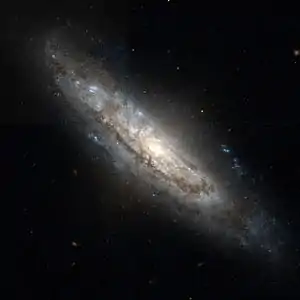NGC 2748
NGC 2748 is a spiral galaxy in the northern circumpolar constellation of Camelopardalis,[6] located at a distance of 61.3 megalight-years from the Milky Way.[3] It was discovered September 2, 1828 by John Herschel.[6] The morphological classification of SAbc[5] indicates this is an unbarred spiral with moderate to losely-wound spiral arms. It is a disk-like peculiar galaxy with a stellar shell that is rotating about the main galactic axis. This shell was most likely formed through the capture and disruption of a dwarf companion.[7] The galactic nucleus likely contains a supermassive black hole with a mass of 4.4+3.5
−3.6×107 M☉, or 44 million times the mass of the Sun.[5]
| NGC 2748 | |
|---|---|
 NGC 2748 imaged by the Hubble Space Telescope | |
| Observation data (J2000.0 epoch) | |
| Constellation | Camelopardalis |
| Right ascension | 09h 13m 43.037s[1] |
| Declination | +76° 28′ 31.23″[1] |
| Redshift | 0.004930[2] |
| Helio radial velocity | 1,473 km/s[3] |
| Distance | 61.3 Mly (18.79 Mpc)[3] |
| Apparent magnitude (V) | 11.7[4] |
| Characteristics | |
| Type | SAbc[5] |
| Apparent size (V) | 2.250 × 0.720 arcmin[2] |
A magnitude 14.5 supernova, designated SN 1985A, was discovered in this galaxy on January 25, 1985. It was located 3″ west and 10″ south of the galaxy's nucleus,[8] and was later classified as a type Ia supernova.[9] On Aug. 31, 2013, a supernova event was reported at a position 19″ west and 21″ north of the core of NGC 2748. It was designated SN 2013ff and reached magnitude 15.2. Subsequent studies found a best match to a type Ic supernova.[10] The discovery of a supernova impostor in this galaxy was announced February 10, 2015.[11] During September 2017, the discovery of supernova SN2017gkk in host galaxy NGC 2748 was announced.[12]
References
- Skrutskie, M. F.; et al. (February 2006). "The Two Micron All Sky Survey (2MASS)". The Astronomical Journal. 131 (2): 1163–1183. Bibcode:2006AJ....131.1163S. doi:10.1086/498708.
- "NGC 2748". SIMBAD. Centre de données astronomiques de Strasbourg. Retrieved 2020-04-16.
- Tully, R. Brent; et al. (August 2016). "Cosmicflows-3". The Astronomical Journal. 152 (2): 21. arXiv:1605.01765. Bibcode:2016AJ....152...50T. doi:10.3847/0004-6256/152/2/50. 50.
- Frommert, Hartmut. "NGC 2748". SEDS. Retrieved 2020-04-16.
- Atkinson, J. W.; et al. (May 2005). "Supermassive black hole mass measurements for NGC 1300 and 2748 based on Hubble Space Telescope emission-line gas kinematics". Monthly Notices of the Royal Astronomical Society. 359 (2): 504–520. arXiv:astro-ph/0502573. Bibcode:2005MNRAS.359..504A. doi:10.1111/j.1365-2966.2005.08904.x.
- Seligman, Courtney. "Celestial Atlas: NGC Objects: NGC 2700 - 2749". cseligman.com. Retrieved 2020-04-15.
- Merkulova, O. A.; et al. (September 2009). "2-D spectroscopy of polar-ring galaxies candidates. II. The peculiar galaxies NGC 2748 and UGC 4385". Astronomy Letters. 35 (9): 587–598. Bibcode:2009AstL...35..587M. doi:10.1134/S1063773709090023.
- Wild, P.; Schildknecht, T. (January 1985). Marsden, B. G. (ed.). "Supernova 1985A in NGC 2748". IAU Circular. 4031: 3. Bibcode:1985IAUC.4031....3W.
- Wegner, Gary; McMahan, Robert K. (February 1987). "Spectroscopy of the Supernova 1982V, 1984A, and 1985B". Astronomical Journal. 93: 287. Bibcode:1987AJ.....93..287W. doi:10.1086/114312.
- Brimacombe, J.; et al. (September 2013). Green, D. W. E. (ed.). "Supernova 2013ff in NGC 2748 = Psn J09133888+7628108". Central Bureau Electronic Telegrams. 3647: 1. Bibcode:2013CBET.3647....1B.
- Tartaglia, L.; et al. (June 2016). "The Supernova Impostor PSN J09132750+7627410 and Its Progenitor". The Astrophysical Journal Letters. 823 (2): 7. arXiv:1604.04628. Bibcode:2016ApJ...823L..23T. doi:10.3847/2041-8205/823/2/L23. L23.
- Onori, F.; et al. (September 2017). "Spectroscopic observation of SN2017gkk by NUTS (NOT Un-biased Transient Survey)". The Astronomer's Telegram. 10698. Bibcode:2017ATel10698....1O.
External links
 Media related to NGC 2748 at Wikimedia Commons
Media related to NGC 2748 at Wikimedia Commons- Images
- Spectral data
- Supermassive black hole mass measurements for NGC 1300 and NGC 2748 based on HST emission-line gas kinematics